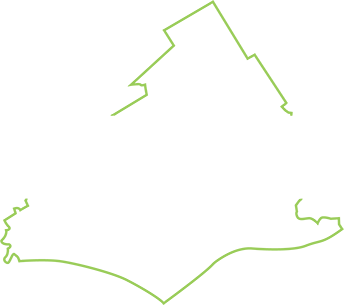 Far too often, we fall short or lose sight of our financial plans because we’re inundated with debt, stumble across financial emergencies, spend more than we save and encounter other issues that stop us from reaching our goals. Most recently, all of us have been coping with the unforeseen event of the COVID-19 pandemic, which has nullified many people’s plans and exposed their safety nets…or lack thereof. If the COVID-19 pandemic has shown you why achieving financial independence is so important, you’re not alone. However, as with any goal, challenges present themselves, especially when it comes to your money. Although we will all experience financial burdens or hindrances, the following 10 habits from the financial experts at BHCU will teach you how to become financially independent and get you back on the right financial track!
Far too often, we fall short or lose sight of our financial plans because we’re inundated with debt, stumble across financial emergencies, spend more than we save and encounter other issues that stop us from reaching our goals. Most recently, all of us have been coping with the unforeseen event of the COVID-19 pandemic, which has nullified many people’s plans and exposed their safety nets…or lack thereof. If the COVID-19 pandemic has shown you why achieving financial independence is so important, you’re not alone. However, as with any goal, challenges present themselves, especially when it comes to your money. Although we will all experience financial burdens or hindrances, the following 10 habits from the financial experts at BHCU will teach you how to become financially independent and get you back on the right financial track!
Set Specific Goals
Setting specific goals is important. If you’re looking to purchase a car, buy a house or retire, you are going to want to create a plan for saving a certain dollar amount for them. If you do not set goals for future purchases or plans, you will not have anything to work towards.
Create a Budget
Making and sticking to a budget is another important financial planning step because it will ensure that your bills are paid and your savings are on track. Plus, creating a budget will also help support your goals because it will provide you with something that you can evaluate weekly or monthly. If you’re overwhelmed by the thought of figuring out your ideal budget, don’t be! An online financial calculator will make this step quick and easy.
Avoid High-Interest Debt
High-interest debt is detrimental to your financial freedom, particularly when it comes to credit cards. To avoid this, be sure to make a point of paying off credit card balances each month to avoid additional fees and racking up balances. If you find yourself strapped, look for fixed consolidation loans with lower interest rates and a more manageable payment, or opt for the iSAVE Credit Card, which will give you low rates, no balance transfer fees and cash back every month!
Create Automatic Savings
Pay yourself first by making automatic deposits into a savings account. Additionally, if your employer offers a retirement plan with a matching contribution benefit, do not pass up free money. Automating savings is a great approach, because if you do not see it, you won’t think about spending it! To get the most out of a savings program, look into the iSAVE Savings program, which is a high-yielding account for everyday money and for different savings goals.
Monitor Your Credit Regularly
Your credit score is critical to your financial health. It impacts loan rates, car insurance, life insurance premiums and even getting a job. Checking your credit score regularly is highly recommended and can even prevent fraudsters from applying for credit in your name.
Research
Competition is everywhere, so it’s important to stay abreast of changes in tax laws each year to ensure that all your adjustments and deductions are maximized. Also, make it a priority to keep up with current events, financial news and developments in the stock market, and do not hesitate to adjust your investment portfolio appropriately. After all, knowledge is the best defense against those who prey on unsophisticated investors to turn a quick buck!
Proper Maintenance
Taking good care of your property—from cars to lawnmowers, shoes to clothing—makes everything last longer. As the cost of maintenance is a fraction of the cost of replacement, it’s an investment that you won’t want to miss out on. When you want to learn how to become financially independent, it’s important to make taking care of your belongings a priority.
Live Below Your Means
Mastering a frugal lifestyle by having a mindset of living life to the fullest with less is not so hard. In fact, many wealthy individuals developed a habit of living below their means before their rise to affluence. This isn’t a challenge to adopt a minimalist lifestyle or a call to action to head to the dumpster with things you’ve hoarded over the years. Making small adjustments by distinguishing between the things you need and the things you want is a financially helpful habit that you should—and need to—put into practice in order to achieve financial independence.
Take Care of Your Health
The principle of proper maintenance also applies to the body — that is why it’s important to invest in good health with regular visits to doctors and dentists, while also following the advice on any problems you encounter. Many problems can be helped—or even prevented—with lifestyle changes, such as more exercise and a healthier diet. Some companies have limited sick days, making it a notable loss of income once those days are used up. Obesity and ailments make insurance premiums skyrocket, and poor health may force earlier retirement with a lower monthly income.
Protect Your Identity
Protecting your identity is crucial. Not only is having your identity jeopardized a safety issue, but it can also impact your credit score, your ability to get approved for loans or credit cards and your money in general. Fraudsters often try to steal names, social security numbers, birthdates, banking information and credit card numbers. If this information is stolen from you, it can affect your ability to achieve financial independence. To prevent this and protect your identity, sign up for fraud alerts and look into identity and credit monitoring services.
Although these 10 steps won’t solve all of your money problems, they will help you develop healthy financial habits that can start you on your path to financial independence—whatever that means for you! If you would like help achieving financial independence, contact us today.





